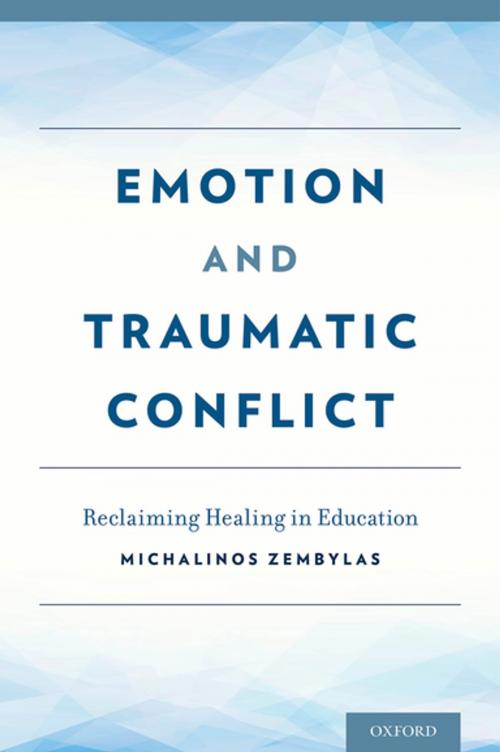Emotion and Traumatic Conflict
Reclaiming Healing in Education
Nonfiction, Health & Well Being, Psychology, Social Psychology| Author: | Michalinos Zembylas | ISBN: | 9780199982783 |
| Publisher: | Oxford University Press | Publication: | July 1, 2015 |
| Imprint: | Oxford University Press | Language: | English |
| Author: | Michalinos Zembylas |
| ISBN: | 9780199982783 |
| Publisher: | Oxford University Press |
| Publication: | July 1, 2015 |
| Imprint: | Oxford University Press |
| Language: | English |
Do the emotional responses of students and to traumatic conflict constitute insurmountable obstacles in peace education efforts? How do hegemonic narratives shape the emotions of ethnic identity and collective memory, and what can be done pedagogically to transform the powerful influence of such narratives and emotions? Can peace education efforts that foreground emotion in critical ways become a productive pedagogical intervention in conflicted societies? Emotion and Traumatic Conflict takes us through an ethnographic journey into a specific site of conflict to show how emotions are entangled with educational efforts towards peacebuilding, healing, and reconciliation. While sociologists, anthropologists, historians, and political scientists have long analyzed the emotional dynamics of conflict and peace, rarely have educators looked into the emotional complexities of traumatic conflict, the impact of emotion in everyday school interactions and pedagogical practices, and the consequences of the role of emotion in what has become known as "critical peace education." This book not only offers an analysis of the emotional consequences of traumatic conflict in schools, it also develops an innovative, compelling, and cross-disciplinary perspective on the entanglement of emotion, power, politics, trauma, healing, and critical education. The book provides a detailed ethnographic analysis of the ideological appropriation of emotions of conflict in schools, yet it pushes boundaries further through a theorization of the consequences of this appropriation and the pedagogical interventions required to challenge, undermine, or subvert this process. Zembylas argues that these pedagogical interventions, rooted in both psychoanalytic and socio-political perspectives of trauma and emotion, ought to engage emotions as critical and transformative forces in peace education. Grounded in recent literature on affect and emotion that spans the social sciences, Zembylas's analysis of the emotions of traumatic conflict in education offers a provocative proposal for the role of critical peace education in healing and reconciliation.
Do the emotional responses of students and to traumatic conflict constitute insurmountable obstacles in peace education efforts? How do hegemonic narratives shape the emotions of ethnic identity and collective memory, and what can be done pedagogically to transform the powerful influence of such narratives and emotions? Can peace education efforts that foreground emotion in critical ways become a productive pedagogical intervention in conflicted societies? Emotion and Traumatic Conflict takes us through an ethnographic journey into a specific site of conflict to show how emotions are entangled with educational efforts towards peacebuilding, healing, and reconciliation. While sociologists, anthropologists, historians, and political scientists have long analyzed the emotional dynamics of conflict and peace, rarely have educators looked into the emotional complexities of traumatic conflict, the impact of emotion in everyday school interactions and pedagogical practices, and the consequences of the role of emotion in what has become known as "critical peace education." This book not only offers an analysis of the emotional consequences of traumatic conflict in schools, it also develops an innovative, compelling, and cross-disciplinary perspective on the entanglement of emotion, power, politics, trauma, healing, and critical education. The book provides a detailed ethnographic analysis of the ideological appropriation of emotions of conflict in schools, yet it pushes boundaries further through a theorization of the consequences of this appropriation and the pedagogical interventions required to challenge, undermine, or subvert this process. Zembylas argues that these pedagogical interventions, rooted in both psychoanalytic and socio-political perspectives of trauma and emotion, ought to engage emotions as critical and transformative forces in peace education. Grounded in recent literature on affect and emotion that spans the social sciences, Zembylas's analysis of the emotions of traumatic conflict in education offers a provocative proposal for the role of critical peace education in healing and reconciliation.















